Pot tourism has room to grow
February 9, 2017
Weed legalization has spread further than ever before in the U.S. Eight states and Washington D.C. have legalized recreational cannabis while the rest either have lesser levels of legalization or prohibition.
This makes states like Colorado, Washington and now California destinations for out-of-state tourists looking to get high without breaking the law.
Denver voters passed Initiative 300 in November, which allows for social marijuana use at certain businesses, according to The Denver Post. Coffee shops, restaurants and bars are now open for legal pot consumption. Yoga studios can also be certified under certain circumstances.
The Denver “canna-tourism” scene is booming, accounting for 17 percent of recreational sales in 2015, according to Business Insider. Tourists spent $98 million on recreational weed in Colorado, reports Marijuana Business Daily. In mountain towns, tourists accounted for 90 percent or more of recreational sales.
My 420 Tours out of Denver offers packages ranging from $69 to $1795 that include anything from concentrate tastings, cooking with cannabis courses, facility tours that last anywhere from a few hours to an entire weekend, according to their website.
My 420 Tours also offers experiences in Seattle, like smoke friendly Bed and Breakfasts. Kush Tour offers experiences similar to that of a beer or wine tasting. If you’re interested in the agricultural side of cannabis, there is a Cannabis Gardens Grow Tour.
Initiative 300 makes it easier for Denver canna-tourism to thrive, but the laws in Washington aren’t as relaxed and it’s keeping marijuana based tourism limited.
Amy McGuffin, director of tourism in Kittitas County, is interested in the idea of bringing canna-tourism to Kittitas County, but her hands are tied until the laws involving I-502 become clearer.
“I’m not setting the tone,” McGuffin said.
Through research she has concluded there’s still too much confusion between federal and state laws. Colorado’s Amendment 64 was written with tourism in mind and their allowance of public consumption makes it straightforward and easier to deal with, McGuffin said.
“From a county standpoint, we wanna tread lightly, we have to remember it’s still illegal on the federal level,” McGuffin said.
Sarah Truglio is the director of business development for Kittitas County and operates Catalyst Co-Working, a business incubator. When I-502 first passed there was some initial contact, but nothing came out of it, Truglio said. The business incubator doesn’t have the space to house grow or production operations and there have been no talks to start any marijuana businesses.
Just because the tourism scene isn’t being pushed, it still has potential in eastern Washington. Kush Tours has already contacted McGuffin about adding Kittitas County to its tour route because of the recreational stores in the area. A lot of tours utilize the production side of things and McGuffin has yet to confirm whether production facilities are ready for touring.
“We’re really just opening the doors on it,” McGuffin said.
Currently, there are other less inclusive forms of canna-tourism that can be explored in Kittitas County in the form of smartphone apps that plan travel routes based on pot friendliness and link people to enjoy cannabis influenced hiking.
“We want tourism to be a fun introduction to the area. We don’t want to get stuck in the politics of the industry,” McGuffin said. Elizabeth Weddle


